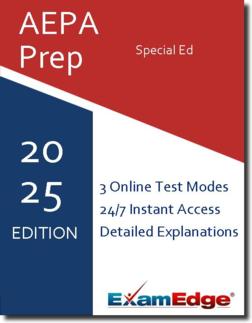AEPA Special Ed (NT601) Practice Tests & Test Prep by Exam Edge - Topics
Based on 32 Reviews
- Real Exam Simulation: Timed questions and matching content build comfort for your AEPA Special Ed test day.
- Instant, 24/7 Access: Web-based AEPA Special Education practice exams with no software needed.
- Clear Explanations: Step-by-step answers and explanations for your AEPA exam to strengthen understanding.
- Boosted Confidence: Reduces anxiety and improves test-taking skills to ace your AEPA Special Education (NT601).

Understanding the exact breakdown of the AEPA Special Education test will help you know what to expect and how to most effectively prepare. The AEPA Special Education has 150 multiple-choice questions The exam will be broken down into the sections below:
| AEPA Special Education Exam Blueprint | ||
|---|---|---|
| Domain Name | % | Number of Questions |
| Students with Disabilities | 20% | 30 |
| Assessment and Program Planning | 20% | 30 |
| Learning Environments and Instructional Practices | 40% | 60 |
| Foundations and Professional Practice | 20% | 30 |


